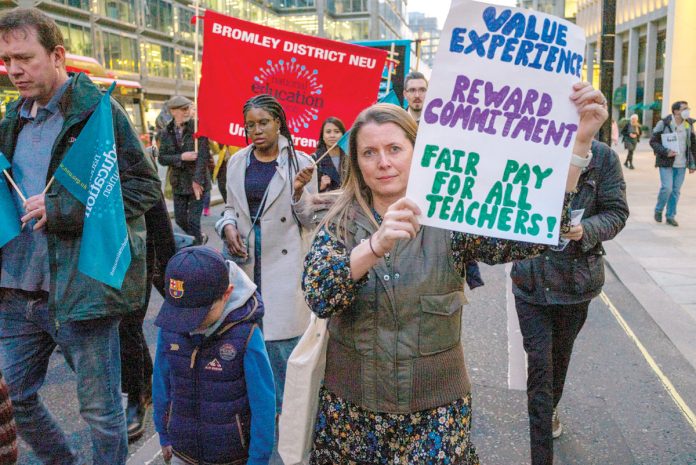After years of pay restraint, public sector workers are gearing up to fight for a pay rise to meet the rising cost of living, by voting on whether to strike. A teacher and a nurse told us why they are voting for strike action.
Teacher: for school funding, pay and workload
I am voting ‘yes’ in the National Education Union (NEU) ballot for strike action for a realistic pay rise to take account of the cost-of-living price hikes. The pay review body’s recommendation of 5% just won’t cut it. And it’s unfunded – schools are expected to pay for the increase out of current funding.
I am voting ‘yes’ because the NEU calls for a fully funded, above-inflation pay rise which doesn’t eat into teaching and learning resources for our students.
I am voting ‘yes’ because a national strike of the largest teaching union in England and Wales will build the confidence of all teachers. It will show our potential strength if we stand together. It will build our confidence to deal with the wider issues of workload, performance-related pay, examination reform and democratic control and management of schools.
David, North London teacher
- Teachers and school support staff in the NEU working in schools are being balloted until 13 January. A ballot of NEU members in sixth-form colleges closes on 11 November. Teachers who are members of NASUWT are being balloted until 9 January.
Nurse: for a proper pay rise and fully resourced NHS
After working through the pandemic, receiving claps on the doorstep, and being hailed as heroes, the very least NHS workers hoped for as a reward was a decent pay rise.
Over the last decade, NHS workers have received a real-terms pay cut of around 20-25%. With official inflation at around 10%, the reality for NHS staff and workers in general is much a higher increase in everyday household necessities.
The insulting 4% pay offer from the Tories, in the face of the cost-of-living crisis, is a slap in the face for all those who risked their lives in the fight against Covid. While millions were wasted on dodgy PPE deals for their donor friends, those hailed as essential key workers are now left facing the reality of choosing between heating their homes or feeding their families.
The low pay, immense stress, and poor working conditions are causing thousands of workers to leave the health service altogether. This has a horrendous impact on the care that the NHS can provide. More than 40,000 nurses have left the NHS in the past year, and one in ten nursing roles are unfilled. The fight for better pay and conditions is also a fight to keep our patients safe.
I will be voting ‘yes’ in the upcoming Unison strike ballot. Yes to a proper pay rise and an NHS that has the resources to look after everyone in our society.
Matt, NHS Nurse
- In the NHS, over 400,000 members of Unison are being balloted until 25 November and Royal College of Nursing members’ ballot closes on 2 November. The Royal College of Midwives has a four-week strike ballot which opens on 11 November. Unite and GMB are balloting some of their members, Unite until 30 November and GMB until 29 November.







